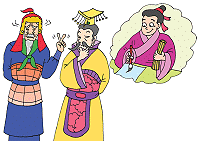Master Tells Stories
Practical Experience is Superior to Empty Theories
Spoken by Supreme Master Ching Hai,
Hsihu, Formosa, April 25, 1992
(Originally in Chinese) Videotape #243
In ancient China, a general was dying and the king asked him, “After your demise, who would be an appropriate successor to you?” Then, instead of his own son, the general recommended someone else.
Surprised, the king asked, “Your son has comprehensively studied military books since childhood. His strategic analyses are very convincing. Wouldn’t he be the most suitable candidate?”
“No! No! That son of mine can only talk big,” said the general. “Although he’s well-versed in military theories, he has absolutely no practical experience on the battlefield. This is why I don’t recommend him.”
However, when the general died the king didn’t follow his advice. He firmly believed that the general’s son would be superb, given his fluent responses and familiarity with strategic deployments and appointed him general. As a result, the son suffered defeat after defeat, much unlike his invincible father because he had no practical experience in warfare, and relied solely on military books for his knowledge.
 Conditions
on a battlefield change constantly and can’t be countered by
theories learned from books. Furthermore, geographical settings and
climates differ from place to place so how can military theories apply
to every battle? The enemy forces are different each time. The morale
and physical state of our armies are affected by the climate and terrain
at different sites so we can’t always “go by the books”
when conducting a battle. The general’s son had never fought
alongside his father and had no practical experience of his own so
a victory was beyond him.
Conditions
on a battlefield change constantly and can’t be countered by
theories learned from books. Furthermore, geographical settings and
climates differ from place to place so how can military theories apply
to every battle? The enemy forces are different each time. The morale
and physical state of our armies are affected by the climate and terrain
at different sites so we can’t always “go by the books”
when conducting a battle. The general’s son had never fought
alongside his father and had no practical experience of his own so
a victory was beyond him.
The same applies to everything else we do. The more we do it, the
better our natural responses become, and this gradually develops into
a habit.![]()
